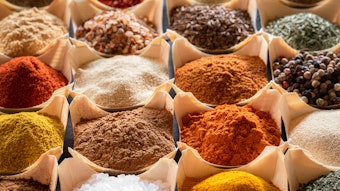Throughout recorded history, man’s fate has been closely linked with the hunger to obtain spices. To most people, the word spices still stirs thoughts of vague and dramatic adventure. Indeed, we still refer to the “spice of life."
History of the trade
For many thousands of years insignificant pieces of bark, dried seeds and leaves, and misshapen roots have found their way along trade routes to establish an important place in both legend and history. Over the centuries the quest for spices has sent thousands of people to their deaths, venturing into the unknown and sometimes discovering undreamed-of continents.
At the time when the great civilisation of Greece aid Asia Minor had developed, many centuries before the birth of Christ, a flourishing spice trade had begun between the East and the main ports of the Mediterranean region. Spices were brought from their origins to various points where they were loaded on caravans for the long overland journey to the markets of the Middle East. The Bible makes numerous references to the importance of the spice trade. lt tells of the Phoenicians, who were renowned navigators and traders, and of Tyre--their busiest port, trading "of all spices and with all precious stones and gold." Around 1000 B.C. King Solomon was visited by the Queen of Sheba and in the First book of Kings, Chapter 10, the Bible tells that she brought as a gift “a very great train with camels that bear spices.” The Roman Emperor Augustus sent expeditions to discover the sources of spices, but even the Romans Iearned nothing of their true origin.










